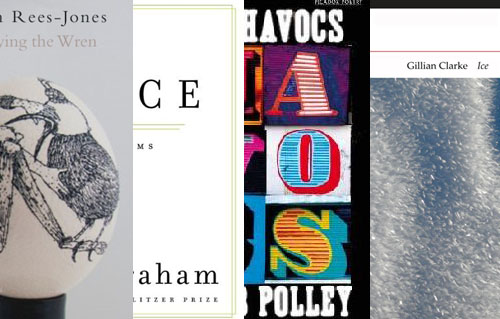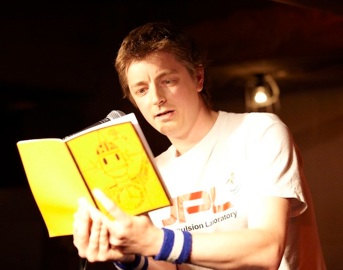
I confess haven’t read all the collections shortlisted for this year’s T S Eliot Prize. But I’ve trawled for informative reviews of each, in order to at least have an idea and also in anticipation of hearing all the poets read on Sunday evening at the Festival Hall. So here we go.
Sean Borodale Bee Journal (Jonathan Cape) (Bees seem to be a hot topic at the moment. Does their essential yet potentially doomed role in the ecosystem give them extra poetic power?) Giles Pitts’ review in Varsity makes me think I would enjoy this collection.
‘10th February: Dismantling the Comb’, for example, is a deeply moving account of bereavement, the poet shining light into the comb’s cells in a fruitless search for life: ‘It’s like the grain of a moon, a spoon-back of pale no one, / just the pail of an egg’s dry opal empty of hunger’.
Gillian Clarke Ice (Carcanet) – Stevie Davies in the Independent calls it ‘partly pastoral elegy, partly georgic’ and offers this assessment.
In 1947, news of the ice-girl’s end aroused in the prescient young Gillian a sense of “her china inkwell emptied of its words,/ the groove for her pen like a shallow grave”.
Julia Copus The World’s Two Smallest Humans (Faber & Faber) – reviewed in the Guardian by Kate Kellaway, who calls it a ‘remarkable collection’. She focuses in particular on the poem ‘Ghost’ which is printed in full at the end of the review, noting that the poet “avoids the first person and keeps a tight rein on emotion.”
SImon Armitage The Death of King Arthur (Faber & Faber) – a gallant Kate Kellaway tackles this tome despiteadmitting initial reluctance (“When I studied Anglo-Saxon at university, I remember complaining that whenever I wasn’t sure of a word, it turned out to mean “spear”.”) She concedes, however, that Armitage “has a miraculous ability to make the past fresh, moving and urgent, not allowing legend to create distance.” Personally I’m not sure how much I’d relish all those bloody battles, but perhaps I need to keep an open mind – if I’ve got the stomach for Julia Copus’s IVF poems then I can face anything. (For some reason, poems about pregnancy and childbirth make me queasy.)
Paul Farley The Dark Film (Picador) – despite Nicholas Pierpan’s excoriating review in Tower Poetry (is this the guy who critiqued my work both times I submitted stuff for the Poetry Society’s ‘Prescription’ service? I recognise the style!) I am interested to read this collection, if only to see if there’s more to it than Pierpan fancies. (For example, ‘Saturday Irons’ he dismisses with “Are the final two lines tongue-in-cheek, or just bathetic? I honestly can’t tell; they don’t work either way.”)
Jorie Graham P L A C E (Carcanet) – is this is the front-runner, having already won the Forward Prize? Here’s Sean O’Brien’s review in the Guardian. Funnily enough I only heard of Jorie Graham recently, when I asked poet friend Lynne about American poetry, in which she’s pretty much steeped. Must explore.
Kathleen Jamie – The Overhaul (Picador) – I was googling this to find a review and got sidetracked by a wonderful interview on the Scottish Review of Books. I like the sound of Kathleen Jamie, she comes across a bit like Don Paterson, all dry and matter-of-fact what’s-the-fuss-all-about. Must be a scottish thang. Anyway, here’s Maria Johnston’s review in the Guardian of what sounds like a fine collection.
Sharon Olds Stag’s Leap (Jonathan Cape) – my poet friend Charlotte lent me a copy of this to read a couple of months ago and there was something terrifyingly gripping about it – the story of a marriage break up in painful, masochistic detail. It gave me bad dreams – I suppose it played on my greatest nightmare, which would be to lose the love and fidelity of my husband. But here’s a wonderful video interview / profile on the PBS website where Sharon reads from the book and talks about her writing and her life. There’s a sympathy, acceptance and calmness about her that I nearly missed in the reading of Stag’s Leap.
Jacob Polley The Havocs (Picador) – so I click on the Guardian’s review of this collection and there’s a photo of a beekeeper – wtf! Anyway, Ben Wilkinson finds much to admire:
Tripping through assorted rhythms, sonnets, end-rhymed quatrains and the looping lines of its centrepiece, it is as formally vibrant as the luminous letters that adorn its cover….The Havocs may be an uneven collection that sometimes finds Polley treading water, but a handful of its poems are so moving and memorable you might just forgive him.
Deryn Rees-Jones Burying the Wren (Seren) – Carl Griffin in the Wales Arts Review suggests that this collection on ‘recollections and grief’ has its ‘fair share of poems that should have been buried with the wren’. Nevertheless he finds ‘ingenious images’ as well as ‘snatches of comedy and joy’ in her writing.















